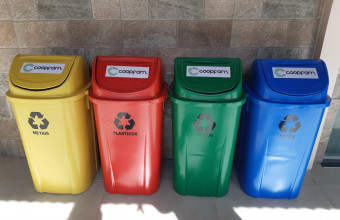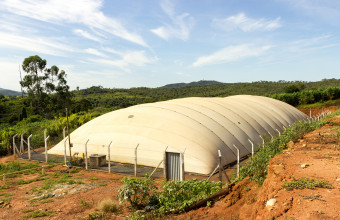The Organization of Brazilian Cooperatives (OCB) permanently acts in the construction of sustainable public policies and in the dissemination of good environmental practices adopted by Brazilian cooperatives. The aim is to show our members different ways to contribute to economic development without neglecting the care for the environment and people.
The OCB System was one of the first representation entities to disclose to its members the opportunities of the Kyoto Protocol – an international agreement signed in 1997 by 55 countries, including Brazil, which committed to reduce greenhouse gas emissions to stop the advance of global warming.
Since then, the Brazilian cooperatives have started to look for alternatives to raise funds in the carbon credit market, in force since the creation of the Protocol. The OCB System has even promoted seminars with experts in the area to expand the volume of cooperative projects.
We also actively collaborated with the preparation of Law No. 12,187, of 2009, which deals with the National Policy on Climate Change, and its respective Sector Plan for Mitigation and Adaptation to Climate Change for the Consolidation of a Low Carbon Emission Economy in Agriculture, in 2012. In this opportunity, it became clear the importance of production practices such as pasture recovery, crop, livestock and forest integration, animal waste treatment and agroforestry systems.
FOREST CODE
Another crucial action of the OCB System towards the environment took place in 2012, during the debates around the regulation of the new Brazilian Forest Code (Law 12,651/2012). On behalf of Brazilian cooperatives, we politically defended the need to combine productivity with sustainability, and the preservation of the environment with the effective adoption of mechanisms for monitoring native forests, which was materialized in the Rural Environmental Registry.
After the approval of the new Forest Code, the challenge was to disseminate and inform the cooperative public about the new legislation and its instruments. To this end, we signed a cooperation agreement with the Brazilian Ministry of the Environment (MMA). Technicians from the cooperative movement, from the ministry and from the Brazilian Institute for the Environment and Renewable Natural Resources (Ibama) held more than 30 seminars throughout the country and worked on the preparation of publications on the subject. OCB also collaborated in the improvement of the Rural Environmental Registry (CAR) software and is currently contributing to the development of a dynamic analysis mechanism for the registry, which will speed up the regularization process of rural properties.
CLEAN ENERGY WITH THE SEAL OF COOPERATION
The key role of the OCB System in the matter of energy generation goes beyond the natural productive processes of the cooperatives.
Thanks to the OCB’s action together with the National Agency for Electrical Energy (ANEEL) it was allowed that these consumers organize themselves into cooperatives to produce their own energy, in a renewable way and compensate the volume of energy produced for the reduction of the cooperative members’ electricity bill. It is worth pointing out: the cooperative model was the only one accepted by ANEEL to perform the activity with individuals.
This opportunity – the generation of energy by cooperatives in the compensation system – has expanded and diversified the partnership between the OCB System and the DGRV (German Cooperative Organization), which was already strong for the development of Brazilian credit unions. Today, the two institutions work together to stimulate the generation of renewable energy in Brazilian cooperatives.
PLANS FOR THE FUTURE – ZERO CARBON EMISSION
The OCB System invested about R$ 1 million to train 680 members in the following topics: environmental regularization, Low-Carbon Agriculture Program, and Renewable Energies.
The active participation of the cooperative sector with the public authorities also helps in the recognition of our business model as a tool for sustainable development, capable of helping Brazil to play its role as a protagonist in the generation of a low-carbon economy.
For the future, we intend to expand our protagonism and, consequently, the recognition of the cooperative movement as a tool for sustainable development, always collaborating with the editing of public policies aimed at achieving and maintaining a carbon-neutral economy.





